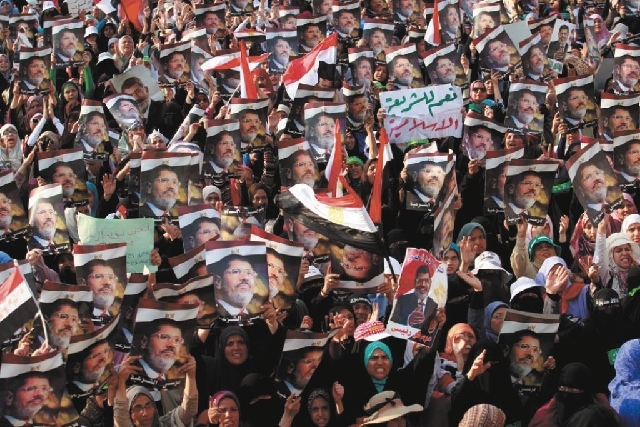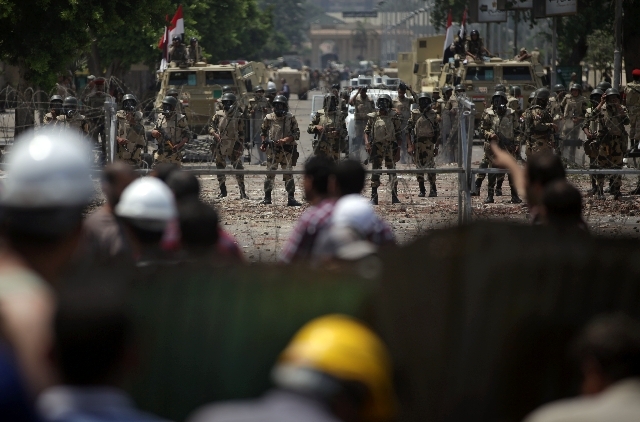Clashes by Egypt army, protesters kill at least 54


CAIRO — More than 50 supporters of Egypt’s ousted president were killed by security forces Monday in one of the deadliest single episodes of violence in more than 2 ½ years of turmoil. The toppled leader’s Muslim Brotherhood called for an uprising, accusing troops of gunning down protesters, while the military blamed armed Islamists for provoking its forces.
The early morning carnage at a sit-in by Islamists outside the Republican Guard headquarters, where ousted President Mohammed Morsi was first held last week, further entrenched the battle lines between the ousted president supporters and his opponents. The uproar weakened the political coalition that backed the military’s removal of the country’s first freely elected leader.
Egypt’s top Muslim cleric, the sheik of Al-Azhar, warned of civil war and took the unusual step of announcing he would seclude himself in his home until the two sides “stop the bloodshed.”
The sole Islamist faction that backed Morsi’s removal, the ultraconservative Al-Nour Party, suspended its participation in talks on forming a new leadership for the country. The group is now torn by pressure from many in its base, furious over what they saw as a “massacre” against Islamists.
Both the military and the Brotherhood appeared determined not to back down in the confrontation. The Brotherhood accuses the military of carrying out a coup against democracy, while their opponents say Morsi squandered his 2012 election victory and leading the country into a Brotherhood monopoly on power.
The Freedom and Justice party, the Muslim Brotherhood’s political arm, called on Egyptians to rise up against the army, which it accused of turning Egypt into “a new Syria.” The new military-backed leadership, meanwhile, was pushing ahead with its post-Morsi political plans, working on a timetable for new presidential elections and a new Cabinet.
“This could be a moment of extremism for both sides” of the equation, Mohammed Mahsoub, a member of the Islamist Wasat Party told Al-Jazeera TV.
Immediately, both sides presented their versions of what happened at the protest site, where around 1,000 Morsi supporters had been camped out for days in the streets around a Mosque near the Republican Guard Headquarters. After the violence began around dawn, the two sides battled it out for around three hours.
Protesters and the Brotherhood said it began when troops descended on them and opened fire unprovoked as they finished dawn prayers.
“I was in the last row praying. They were firing from the left and right,” said Nashat Mohammed, who had come from southern Egypt to join the sit-in and was wounded in the knee in the mayhem. “We said, ‘Stop, we’re your brothers. They shot at us from every direction.”
Spokesmen for the military and police, however, gave a nationally televised news conference saying gunmen among the protesters sparked the battle.
Army Col. Ahmed Mohammed Ali said police and troops guarding the Republican Guard complex came under “heavy gunfire” at around 4 a.m. and attackers on rooftops opened fire with guns and molotov cocktails. A soldier and two policemen were killed, and 42 in the security forces were wounded, eight critically, he said.
While he said troops had a right to defend the facility, however, Ali did not directly explain how the protester deaths occurred. He expressed condolences but offered no apologies for the deaths.
A collection of footage of the clashes provided by the military, aired on Egyptian TV stations, showed protesters on rooftops lobbing projectiles at troops below, including fire bombs and toilet seats. It also showed some armed protesters firing at close range at the troops, but it showed no footage of what the military did. It was also not clear at what time in the fighting the videos were shot. It included aerial views of the clashes.
Several witnesses from outside the protest said the gunfire started when troops appeared to move on the camp.
University student Mirna el-Helbawi told The Associated Press that she watched from her 14th floor apartment overlooking the scene, after she heard protesters banging on metal barricades, a common battle cry. El-Helbawi, 21, said she saw troops and police approaching the protesters, who were lined up on the street behind a make-shift wall. The troops fired tear gas, the protesters responded with rocks, she said.
Soon after, she heard the first gunshots and saw the troops initially retreat backward — which she said led her to believe the shots came from the protester side. She saw Morsi supporters firing from rooftops, while the troops were also shooting.
By the end, at least 51 protesters were killed and 435 wounded, most from live ammunition and birdshot, emergency services chief Mohammed Sultan, according to the state news agency.
Reeling from scenes of bloodied protesters in hospitals and clinics, many with gaping wounds, some of the country’s politicians tried to push new plans for some sort of reconciliation in the deeply polarized nation.
Sheik Ahmed el-Tayeb, the grand imam of Al-Azhar, the most prominent Sunni Muslim institution, demanded that a reconciliation panel with full powers immediately start work and that those detained in recent days be released. Five prominent Brotherhood figures have been jailed since Morsi’s fall, and Morsi himself is held in detention in an unknown location.
El-Tayeb’s announcement he was going into seclusion was a symbolic but dramatic stance — a figure seen as a moral compass by many Egyptians expressing his disgust with all sides in the events. Egypt’s Coptic popes have at times gone into seclusion to protest acts against the Christian community, but the sheik of Al-Azhar has never done so.
Struggling whether to fully bolt from the new leadership, the ultraconservative Al-Nour Party denounced what it called incitement against fellow Islamists. Speaking to Al-Jazeera TV, the party’s chief Younes Makhyoun raised the possibility of calling a referendum on Morsi as a compromise measure.
There were multiple calls for an independent investigation into the bloodshed as a way to establish the truth and move forward.
The military-backed interim president, Adly Mansour, ordered a judicial inquiry into the killings. Significantly, the statement from his office echoed the military’s version of events, saying the killings followed an attempt to storm the Republican Guard’s headquarters.
The escalating chaos could further complicate Egypt’s relations with Washington and other Western allies, which had supported Morsi as the country’s first freely elected leader and now are reassessing policies toward the military-backed group that forced him out.
Still, the White House said Monday that cutting off the more than $1 billion in annual aid to Egypt was not in the U.S.’s best interests, though it was reviewing whether the military’s moves constitute a coup — which would force such a measure under U.S. law.
But Egypt’s new leadership appeared to be pushing ahead with the “road map” the military set up for the post-Morsi political system. Negotiations have been ongoing over appointing a prime minister, who will hold the main powers in governing the country. Talks have been stalled by Al-Nour Party vetos of candidates from liberal and secular factions — but if the party drops out, those factions may push through a candidate.
The leadership is expected to issue a declaration soon setting a timetable to create a new panel to amend or rewrite the Islamist-drafted constitution passed during Morsi’s presidency — and to hold new presidential elections, possibly as early as six months from now. Al-Nour had pushed for only amendments.
At the same time, the military was pushing hard to isolate Islamists from public support, depicting their protests as rife with gunmen and weapons.
Ali said the sit-in outside the Guard headquarters had “abandoned peacefulness.” Ali also pointed to other incidents of Islamist violence after Morsi’s toppling on Wednesday, including coordinated, deadly attacks by extremists on military installations in the Sinai Peninsula.
Prosecutors in Cairo also ordered the closure of the Brotherhood party’s headquarters amid investigations into a cache of weapons found there, according to the official Middle East News Agency.
During the wave of protests last week that led to Morsi’s removal, Brotherhood supporters used guns in several instances to defend their offices when opponents marched on them — or outright attacked them.
Pushing ahead with the military “road map” is likely to further infuriate Islamists who have vowed to continue protests until Morsi is restored and now depict the military as willing to wipe them out by force of arms.
Outside hospitals and clinics near Monday’s violence, Morsi supporters waved the bloodied shirts of the dead or wounded.
“The only thing the military understands is force and they are trying to force people into submission,” said Marwan Mosaad, speaking at a field hospital run by Morsi’s supporters. “It is a struggle of wills and no one can predict anything.”
Abu Ubaida Mahmoud, a religion student from Al-Azhar University, said he had been praying when the sit-in’s security teams began banging on metal barricades in warning. He then saw troops coming out of the Guard complex.
“The number of troops that came from inside was stunning,” said Mahmoud, who was wounded in the hand.
It was “as if they were firing at an enemy,” said another protester, Ahmed Youssef.
A fire raged from an apartment in a building overlooking the clashes. Images showed men throwing spears from atop nearby building rooftops. Other protesters were lobbing fire bombs at the troops. It was not clear at what stage in the melee the footage was filmed. Security officers were showing cameras bullet casings, and troops were carrying injured colleagues.
By the afternoon, the sit-in site was cleared along with blockades that had been set up on roads. The site of the early morning clashes, a strip of road about a kilometer long (about half a mile), was covered with rocks, shattered glass, shoes, clothes, prayer rugs and personal photographs.
A big Morsi banner remained hoisted in front of the Republican Guards’ building. On the ground below it, graffiti read: “Where are our votes?”
————
Associated Press correspondent Paul Schemm contributed to this report.












